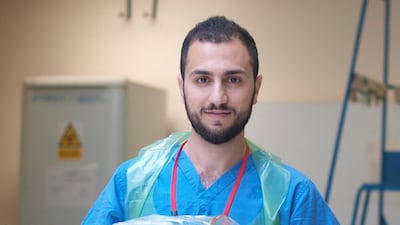A Syrian refugee who gave his last $1,000 to people smugglers during his flight from the country has developed a new technique that could help identify some of the thousands of nameless victims from eight years of war.
Rawad Qaq, 28, was a newly qualified dentist from Idlib when left his family and friends in Syria to avoid national service with the military and joined more than a million people heading towards Europe in 2015.
After a perilous journey with 55 other refugees from Turkey to Greece in a boat fit for 10-20 people and a 22-day overland trip through Europe, Mr Qaq arrived in Germany.
He remained there for a year until he chanced upon an online advert to study in Scotland. He applied and his “one per cent” chance of success led to a scholarship at the University of Dundee, where he has developed the new technique and embarked on further research aimed at helping to identify victims of war from limited body parts.
“There will be hundreds of thousands of people in Syria in mass graves,” he said. “But this is not just for my country, but for everywhere.
“There is an ongoing global problem from deaths, disappearances of thousands of people and the destruction of cities and infrastructure.”
Mr Qaq’s work addresses the problems of chaotic, war-torn nations where post-conflict investigators may find that skulls are all that remains of a body with little prospect of extracting DNA – or organised national databases to make sense of any findings.

His work in Dundee saw him take 22 separate measurements from some 135 skulls and discovered that four of those measurements were strong indicators of the gender of a dead person.
The changes were attributed to hormonal changes unique to men or women and gave an accuracy of some 86 per cent. Only the pelvis can give a better indicator of gender than the skull.
His work has been published in a forensic science journal and he has created a gender calculator tool that can be used in the field with limited instruments.
He aims to build a database that can further narrow down the identification of victims through facial reconstruction modelling, photographs supplied by families and dental examinations that would increase the likelihood of successful hits.
“Most of the countries in the Middle East don’t have health systems that keep records and that’s a big problem,” he said.
Mr Qaq’s journey to become a successful researcher in the UK highlights the lost opportunities for talented refugees who might not be allowed to work officially or study during months of movement with limited documents and rights.
His flight from Syria saw him head to Lebanon and Turkey, where he kept up his dental skills by treating fellow refugees.
He handed over his savings after he was promised a place on a ship to take him to Europe but tried to back out when he discovered that a rickety boat was due to take him to Greece.
“I told them no way, it was a risk to life. But these people had taken the money and they didn’t care,” he said. “It was horrible, 55 people in the middle of the night including children who were crying.”
From Greece he travelled through Macedonia, Serbia, Hungary and Austria before he reached Germany and the opportunity to further his work.
His ambition remains to return to Syria and his family who have remained in Idlib. “The situation there is still very bad,” he said. “But I wish I could go home, it’s a dream for me.”


